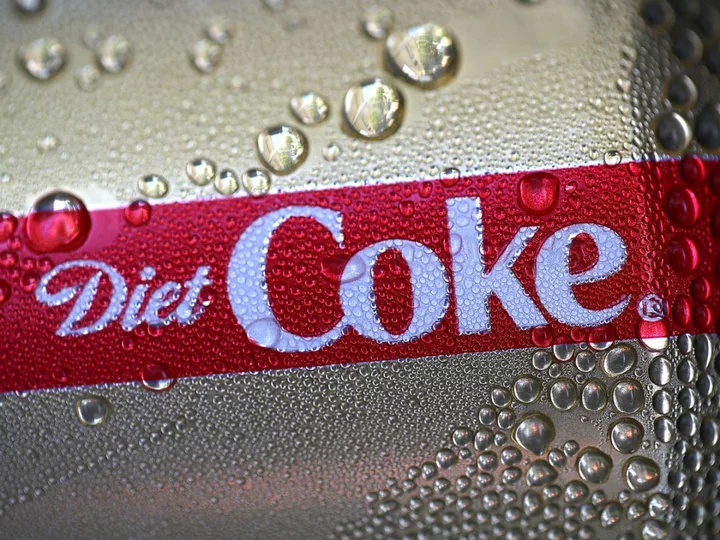
Diet Coke fanatics react to forthcoming WHO announcement on ‘possibly cancerous’ aspartame: ‘The final straw’
Fans of Diet Coke have reacted with despair at reports that the World Health Organisation (WHO) may catagorise aspartame – an artificial sweetener in the drink – a potential carcinogen. It was reported on Thursday (29 June) that the health organisation’s cancer research unit, the International Agency for Research on Cancer (IARC), is preparing to label aspartame as potentially cancerous from July. Aspartame is a low-calorie artificial sweetener that is approximately 200 times sweeter than sugar and is used in a huge number of soft drinks, including Diet Coke, Pepsi Max, Diet Irn Bru, and Sprite Zero, among others. It is also used in foods such as chewing gum, candy, breakfast cereal, frozen desserts and puddings, and gelatins. Although the IARC’s ruling on the sweetener remains confidential until July, Diet Coke fans are already wondering if they might have to give up their favourite fizzy drink. “If they interfere with Diet Coke it will be the final straw for me I’m afraid,” one person warned. Another joked they have already “drunk the Diet Coke equivalent of swimming at a superfund site” in their lifetime. “You can take away my Diet Coke when you pry it out of my cold dead hands,” a third mordantly added. “Listen, if you’re going to take away Diet Coke from us, you better be prepared for 72 per cent of women aged 25-45 to quit their jobs,” another person claimed. “That’s all I’m saying. *Cracks open third Diet Coke before noon*” Others appeared smug that they had never switched from regular full-fat Coke – which contains around 10.6g of sugar per 100ml, equating to 35g per 330ml can – to the low-sugar version. One person referred to a scene from hit series Friends that showed Chandler (Matthew Perry) shouting: “I knew it!” Another said: “I told you all that Diet Coke was just as bad as regular Coke.” The IARC is expected to make its decision over aspartame public on 14 July, the same day as the Joint WHO and Food and Agriculture Organisation’s Expert Committee on Food Additives (JECFA), which is also reviewing aspartame use this year. JECFA has said it is safe to consume aspartame within accepted daily limits since 1981. An adult weighing 60kg (132 pounds) would have to drink between 12 and 36 cans of diet soda every day to be at risk, a view widely shared by national regulators. The additives committee “conducts risk assessment, which determines the probability of a specific type of harm (eg., cancer) to occur under certain conditions and levels of exposure”. The review of aspartame comes after a study conducted by experts from the French National Institute for Health and Medical Research, and Sorbonne Paris Nord University, published on March 2022, claimed it could increase the risk of cancer in people who consume it. But previous large-scale studies on humans have not revealed similar associations. A separate study published last December found that aspartame was linked to anxiety in mice. The deputy chief scientific adviser of the UK’s Food Standards Agency, Rick Mumford, commented on reports and said: “Our view is that the safety of this sweetener has been evaluated by various Scientific Committees and it is considered safe at current permitted use levels. “The IARC report has not yet been published and, when it is, it will be examined by the JECFA, who will put together a risk assessment by the end of July. We will closely study JECFA’s report and decide whether any further actions are needed.” The Independent has contacted Coca-Cola for comment. Read More Walk this way... but not like that: How men’s walks became sexualised Colleen Ballinger: Everything we know about the ‘grooming’ allegations against YouTuber Miranda Sings Kevin Costner’s estranged wife says she’ll move out of their $145m home on one condition ‘My small rash turned out to be a parasite living in my leg after a beach trip’ Chrissy Teigen welcomes fourth child – how does surrogacy actually work? Heart disease digital check-ups for over 40s being rolled out
2023-06-29 23:50
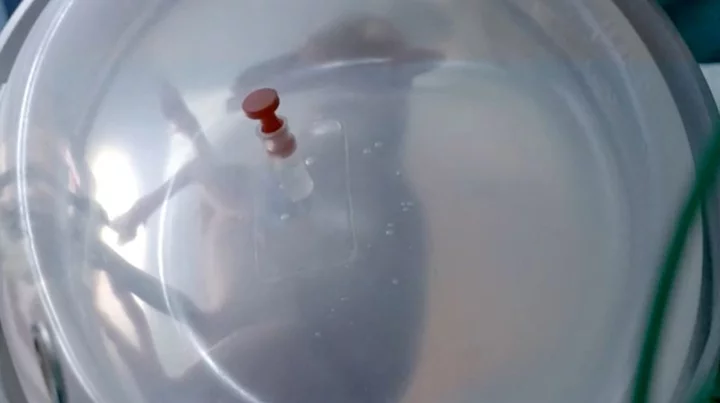
Spanish researchers aim to 'trick nature' with artificial womb
By Horaci Garcia BARCELONA Researchers in Barcelona are trying to "trick nature" by creating an artificial womb for
2023-06-29 19:23
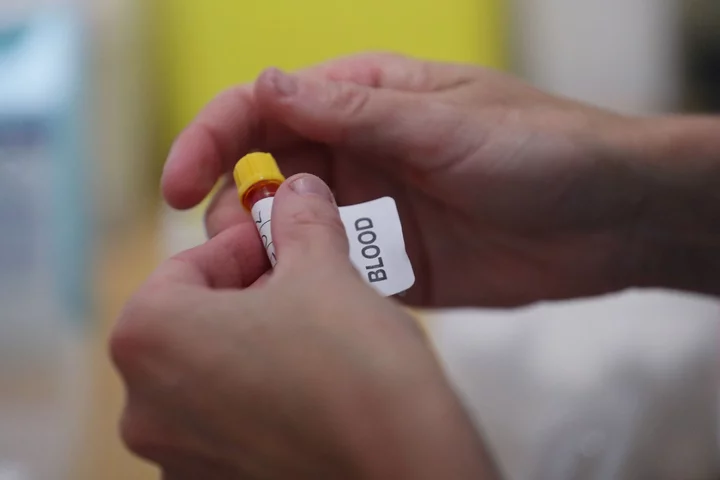
Heart disease digital check-ups for over 40s being rolled out
People over 40 in England will be sent a blood test to carry out at home in a bid to reduce heart disease and obesity. Digital NHS health checks, which will also include an online health questionnaire, will be launched next spring for people aged 40 to 74. Around 15 million people will be eligible, with around one million online checks expected to be carried out over the next four years. Health and Social Care Secretary Steve Barclay said: “Thousands of heart attacks and strokes could be prevented every year through simple health checks, which could save lives and ease pressure on the NHS. “This new digital check-up will mean people can do simple tests and get tailored advice from homes while reducing pressure on GP services.” The home blood test will check cholesterol levels with patients asked to take a blood pressure test at a pharmacy, alongside the online assessment covering details such as weight, height, diet, alcohol intake and exercise levels. Results will be made available online with help available to anyone showing early signs of issues such as diabetes or heart disease, as well as referrals to weight-loss clinics or medication. The online questionnaire will be available via phone, tablet or computer and the Government believes each check will save 20 minutes of NHS time. This could play an important role in helping people live healthier for longer and saving lives in the coming years, while reducing pressure on the NHS Professor Sir Nilesh Silemani Cardiovascular disease is the second biggest killer in England, affecting around 6.4 million people. The Government says the new digital check will help to identify 200,000 people who could benefit from the use of statins, 30,000 cases of hypertension and prevent around 400 heart attacks and strokes over the first four years. Professor Sir Nilesh Samani, medical director at the British Heart Foundation, said: “This initiative will help to reach more people and encourage them to get their blood pressure and cholesterol levels checked so that, where necessary, healthcare professionals can work with them to manage their condition. “This could play an important role in helping people live healthier for longer and saving lives in the coming years, while reducing pressure on the NHS.” Existing NHS health checks for people in the same age group take place face-to-face with a GP and concerns have been expressed that elderly people are not left behind if they struggle with technology. David Baines, vice chair of the Local Government Association, told The Times: “Making more digital health checks available is a useful tool to detect certain illnesses but it should be treated as an addition to, not a replacement for, a physical health check.”
2023-06-29 16:15

Exclusive-WHO's cancer research agency to say aspartame sweetener a possible carcinogen-sources
By Jennifer Rigby and Richa Naidu LONDON One of the world's most common artificial sweeteners is set to
2023-06-29 14:20
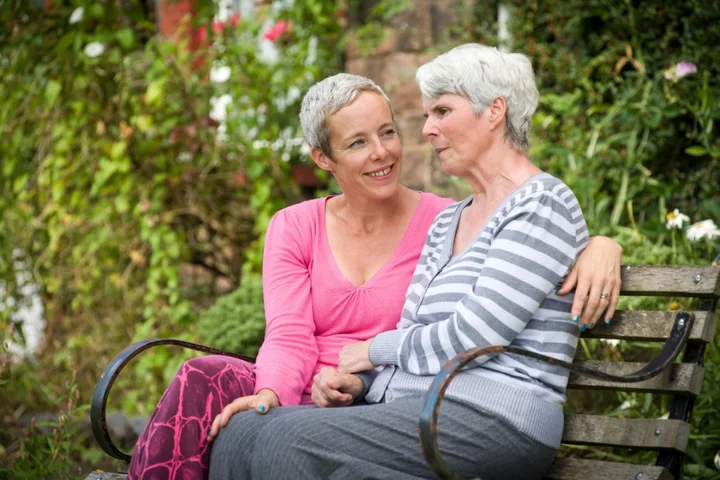
Dementia diagnosis could be sped up thanks to AI
A new artificial intelligence (AI) tool may be able to look for early signs of dementia and Alzheimer’s disease, speeding up diagnosis. The technology, which could help doctors assess the early signs of the condition more efficiently, has been developed by researchers at the University of Sheffield. Known as CognoSpeak, the system uses a virtual character displayed on a screen to engage a patient in a conversation. It asks questions to test memory, inspired by those used in outpatient consultations and conducts cognitive tests, such as picture descriptions and verbal fluency tests. This tool could help patients start treatments sooner, reduce waiting times and give people certainty earlier Dr Dan Blackburn, University of Sheffield After that, the tool uses AI and speech technology to analyse language and speech patterns to look for signs of dementia, Alzheimer’s disease and other memory disorders. Researchers behind the technology suggest it could play a key role in reducing the burden on dementia assessment services, once further testing in GP and memory clinics across the UK is complete. The National Audit of Memory Assessment Services in England and Wales, conducted between January and August 2021 by the Royal College of Psychiatrists and supported by Alzheimer’s Society, found that the average waiting time from referral to dementia diagnosis had increased to 17.7 weeks. This was up from 13 weeks in 2019, with waiting times across services nationwide ranging between zero and 104 weeks (two years), compared to three and 34 in 2019. There are currently around 900,000 people in the UK living with dementia, and this is projected to almost double by 2040, according to the Alzheimer’s Society. Dr Dan Blackburn, from the University of Sheffield’s Department of Neuroscience, said: “Waiting for a possible diagnosis of dementia can be a very anxious time for patients and their families. “This tool could help patients start treatments sooner, reduce waiting times and give people certainty earlier. “The CognoSpeak system could transform how dementia and other memory disorders are diagnosed by speeding up assessments. “This would also free up clinicians’ valuable time and mean that those who need specialist care get access to it as quickly as possible.” Also an Honorary Consultant Neurologist at Sheffield Teaching Hospitals NHS Foundation Trust and researcher at NIHR Sheffield BRC, he added: “There is a real clinical need for this kind of technology. “There are long waiting lists for memory clinics across the UK, but there are also inequalities in accessing the memory clinics service. “The CognoSpeak tool can reduce these inequalities and help make the service more efficient.” The CognoSpeak system could transform how dementia and other memory disorders are diagnosed by speeding up assessments Dr Dan Blackburn Professor Heidi Christensen, from the University of Sheffield’s Department of Computer Science, added: “The way a person speaks can tell us a great deal about their cognitive health and emotional wellbeing, and give us a very early indication of any signs of cognitive decline that may not otherwise have been detected. “The system we’ve developed here at Sheffield uses speech technology to automatically extract these signs and the automation means we can provide a consistent, accurate and fast assessment for everyone. “CognoSpeak is advanced, high tech and based on world-leading research in this field. “We have the biggest collection of data for this type of assessment anywhere in the world, which we’re using to advance the technology and improve its accuracy.” The system is being designed in a way that means once it is fully rolled out, a GP could refer a person with memory complaints to use the technology. CognoSpeak would send the test results back to the GP and then they would decide whether to refer the patient to a memory clinic for further assessment. The programme can be accessed through a web browser – meaning patients are able to take the test in the comfort of their home, rather than having to wait for a hospital appointment to take a pen-and-paper-based assessment. Researchers say early trials have shown the technology is as accurate at predicting Alzheimer’s as the current written tests used to assess or screen for cognitive, memory or thinking impairments. According to the team, previous research has demonstrated accuracies of 90% for distinguishing people with Alzheimer’s from people that are cognitively healthy. Developed by Dr Blackburn and Prof Christensen, the system is still in the research phase, but a £1.4 million National Institute for Health and Care Research (NIHR) grant will allow it to be trialled more widely. The researchers are recruiting 700 participants from memory clinics across the UK to help develop the system further. The tool has been developed in collaboration with Therapy Box – a company specialising in speech and language technology – and the National Institute for Health and Care Research (NIHR) Devices for Dignity MedTech Cooperative (D4D). Read More Charity boss speaks out over ‘traumatic’ encounter with royal aide Ukraine war’s heaviest fight rages in east - follow live Reading for pleasure in childhood boosts brain health in teenage years – study Stan Wawrinka on setbacks, preparing for Wimbledon and friendship with Roger Federer Hacks for saving money on school uniforms
2023-06-29 13:51

Chrissy Teigen and John Legend welcome fourth child via surrogate: ‘Our new love’
Chrissy Teigen and John Legend have announced the arrival of their fourth child, a baby boy born via surrogate. On Wednesday, the cookbook author, 37, and the “All of Me” singer, 44, shared the news that their family had expanded once more on Instagram, where they revealed they’d welcomed a son named Wren Alexander Stephens on 19 June. On Teigen’s Instagram, she reflected on the couple’s surrogacy journey in a lengthy post, in which she revealed that she’s wanted four children for “as long as [she] can remember”. In the emotional post, Teigen then reflected on the loss of her and Legend’s unborn child, Jack, in 2020, with the model revealing that she didn’t think she’d be able to “carry any more babies on my own”. According to Teigen, who gave birth to her and Legend’s third child, a daughter named Esti, in January 2023, she and the singer reached out to a surrogacy agency in 2021 about the possibility of “having two tandem surrogates, each to bring us a healthy baby boy or girl”. However, Teigen revealed that, early on in the surrogacy journey, she also decided that she wanted to try getting pregnant “just one more time”. “If it doesn’t work, we will be okay. We’ve already seen the worst,” she wrote. “I promised I would be okay no matter what happened.” According to the Cravings author, at that point, she and Legend started undergoing IVF, which she noted was the same process that allowed the couple to welcome their daughter Luna, seven, and son Miles, four. “We made new embryos. We did my transfer, and were so happy to learn it worked - we were pregnant with our little girl, Esti,” Teigen wrote, adding that “around this same time,” the couple also met the “most incredible, loving, compassionate surrogate we could ever imagine”. In the candid post, Teigen revealed that the first embryo transfer to their surrogate “didn’t survive,” before noting how “hard” their surrogate fought to prepare for a second transfer. According to Teigen, she and Legend didn’t want to rush the process, and so they were “patient” as she enjoyed the first trimester of her pregnancy “with, of course, a little bit of fear that isn’t any different from any other expecting couple”. Teigen said she and Legend learned that their surrogate was pregnant with a boy as they “crept toward the safe zone” of her own pregnancy, with the celebrity chef writing that she and the family’s surrogate celebrated together with their “growing bellies, our families blending into one for the past year”. In the post, Teigen then revealed that she’d gotten to witness as the “most beautiful woman, my friend, our surrogate,” gave birth “just minutes before midnight” on 19 June. Teigen concluded the lengthy post expressing her gratitude to her surrogate for the “incredible gift” before sharing a photo of their surrogate and one of the couple holding their newborn child in the hospital. The final photo showed a close-up shot of the baby. “Our hearts, and our home, are officially full. And to our Jack, we know both their angel kisses are from you,” she wrote. Legend also shared the news of the baby’s arrival on his Instagram, where he posted a photo of himself surrounded by his and Teigen’s four children, as well as the photo of the couple cradling their newborn. “Wren Alexander Stephens, our new love,” Legend captioned the album. More follows… Read More Chrissy Teigen responds to critics claiming she has a ‘new face’: ‘I gained weight’ Chrissy Teigen praised for thanking team of four nannies in Mother’s Day tribute ‘My small rash turned out to be a parasite living in my leg after a beach trip’ Bre Tiesi reveals whether she’d have another child with Nick Cannon How do I get a mammogram screening?
2023-06-29 03:27

Bre Tiesi reveals whether she’d have another child with Nick Cannon
Bre Tiesi has revealed whether she’d have another child with Nick Cannon, who is already the father of 12 children. The Selling Sunset star shared her thoughts about expanding her family during a recent interview with Entertainment Tonight. Tiesi has one child, Legendary Love, who she welcomed with Cannon in June 2022. According to Tiesi, she’s not sure if she wants to have another child, given how focused she’s been on her career. “I do and I don’t,” she said. “I think that for where I’m at in my career and my life right now, I just don’t know how I could possibly manage another child.” However, she went on to note that she’s not against the possibility of giving Legendary a younger brother or sister. “Part of me does want to give him another sibling, but he has a few of those, so I don’t think he’s necessarily missing out, but it’s hard. I don’t know,” she said, referring to her son’s many half siblings. In addition to Legendary, Cannon welcomed four other children in 2022 with different women. He welcomed his daughter, Onyx Ice Cole, with model LaNisha Cole in September, and his son, Rise Messiah, with Brittany Bell in October. Cannon and Bell also share a six-year-old son, Golden, and two-year-old daughter, Powerful Queen. In November, the comedian and Abby De La Rosa welcomed their daughter, Beautiful Zeppelin Cannon. This is the pair’s third child, as they also share two-year-old twins, Zion and Zillion. The Masked Singer host and Alyssa Scott welcomed their daughter, Halo Marie, in December, one year after their son, Zen, died from a rare brain tumour. In addition, the comedian shares his 12-year-old twins, Moroccan and Monroe, with ex-wife Mariah Carey. Speaking to Entertainment Tonight, Tiesi said that she’s spoken to Cannon about having more children and that he’s “open to whatever”. However, she echoed that if she “can’t do it a hundred per cent, I don’t want to do that”. The realtor also acknowledged that she’s still working on balancing her professional and personal life as a mother of one. “I don’t want to take more attention away from my son than I already do, working like I do, so I’m really trying to figure out how to manage that, and I think adding in another aspect of another human would be very hard,” she explained. Elsewhere in the interview, Tiesi spoke candidly about her unconventional relationship with Cannon, and praised him for being so involved in their child’s life. “So, here’s the thing that I know everyone wants to argue with me about - but he makes his own schedule,” she said. “He can show up every day, when he stops from work. He can come at night. So, he’s here every week, and especially when he’s home, he’s here.” She noted that while she and Cannon don’t have a “set schedule” or “plan things,” he’s still extremely “supportive” of her. “He’s very present and he’s at anything and everything I ask him to be at. So, I’m very happy. He’s very supportive,” she said. During an episode of Selling Sunset that aired last month, Tiesi described her relationship with Cannon as “open,” noting that her “situation is interesting” and that she wouldn’t say she’s “single”. “I don’t want to call it open, but open relationship, I guess. I just know we just had a baby, we’re really happy, so I’m happy in my relationship now,” she said. “I’m not a monogamy kind of person. Everything I’ve ever seen is divorce, and people are unhappy and it ends badly, and the kids suffer. Men can’t keep it together. It’s never us.” Read More Nick Cannon shares Mariah Carey’s ‘high frequency’ reaction to actor having 12 children Nick Cannon accused of misogyny over ‘pathetic’ Taylor Swift remark Nick Cannon forgets one of his children when asked to name all 12 How do I get a mammogram screening? Jonnie Irwin makes rare red carpet appearance as he says ‘every day is a gift’ Nicolas Cage fans praise actor for ‘sweet’ gesture to his son on a plane
2023-06-28 23:26

Elon Musk ‘microdoses ketamine to manage depression’, report says
Elon Musk reportedly takes “microdoses” of “ketamine”, a drug he has praised as being “a better option” than antidepressants when “taken occasionally”. The SpaceX founder is said to use the dissociative anaesthetic to manage depression. Musk, 52, previously tweeted in 2017 about his struggles with mental health. Speculating that he could have bipolar disorder, he spoke of how he experienced “great highs, terrible lows and unrelenting stress”. According to The Wall Street Journal(WSJ), people close to Musk have witnessed him using ketamine in small doses. Following the publication of WSJ’s article on Tuesday (27 June), Musk tweeted that while depression is “overdiagnosed” in the US, it is a “brain chemistry issue” for some people. He believed that “zombifying people” with selective serotonin uptake inhibitors (SSRIs), a widely used type of antidepressant medication, “happens way too much”. “From what I’ve seen with friends, ketamine taken occasionally is a better option,” Musk added. The Independent has contacted Musk for comment. His attorney and top advisor did not respond to WSJ’s request for comment, it was reported. In 2017, Musk answered questions from Twitter users about his personal life and was asked about his mental health. He wrote: “The reality is great highs, terrible lows and unrelenting stress. Don’t think people want to hear about the last two.” When asked if he had bipolar disorder, the South African entrepreneur simply replied: “Yeah.” According to the NHS, bipolar disorder is characterised by extreme mood swings that can range from extreme highs (known as ‘mania’) to extreme lows (depression). It can be treated in several ways, including taking medication to treat prevent and stabilise episodes of mania and depression. In a later tweet, Musk added that he may not be “medically” bipolar, but said he does not know. “Bad feelings correlate to bad events, so maybe [the] real problem is getting carried away in what I sign up for,” he wrote. Microdosing involves consuming small doses of drugs, usually psychedelic or sub-hallucinogenic substances such lysergic acid diethylamide (LSD) or mushrooms with psilocybins. Ketamine is an approved drug in the US for treating severe depression that has not improved with other therapies. In the UK, it is approved as an anaesthetic drug by the Medicines and Healthcare Products Regulatory Agency (MHRA), but not for use in treating depression. However, in 2019, a drug similar to ketamine – known as esketamine, which is taken as a nasal spray – was approved in the UK for treating severe depression. Read More Walk this way... but not like that: How men’s walks became sexualised Sarah Ferguson reveals she almost skipped doctor’s appointment that led to cancer diagnosis Influencers face backlash for promoting Shein factory during PR trip in China Elon Musk vs Mark Zuckerberg: Who would win a fight between tech titans? Elon Musk’s sister says she’s been overcharged due to her last name Nicolas Cage once bought a plane seat for his son’s imaginary friend
2023-06-28 19:24
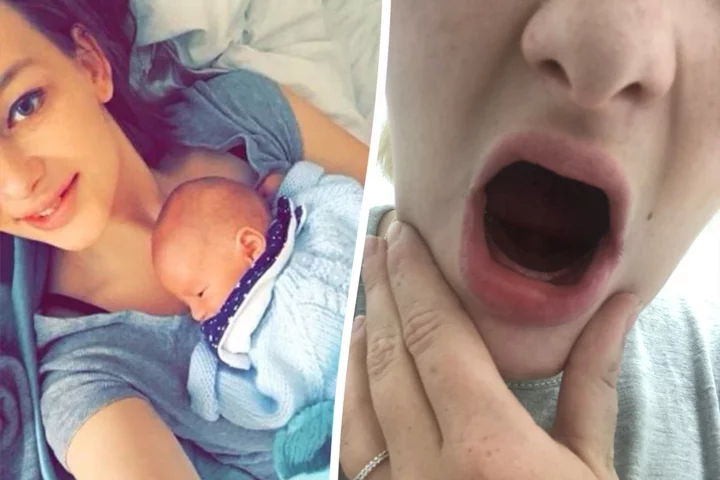
New mum has all teeth removed after rare condition made them fall out during pregnancy
A mum who had her teeth removed after she vomited so much while she was pregnant - has gone on to have more children and embrace life. Louise Cooper, 26, became pregnant for the first time while she was working as a nanny at a ski resort in France. A week after finding out, the mum-of-three said she got so sick she had to move back to the UK. Louise was diagnosed with Hyperemesis Gravidarum (HG) in April 2017 – a condition which affects around 1% of women. Louise would vomit so frequently, her teeth started falling out. Her first child, Zachary, five, was born in November 2017 and six months later Louise had to have all her teeth removed as they were so damaged. Since then, Louise has had two more children, has embraced life without teeth and often goes out without wearing her dentures. Louise, a hairdresser, from Reading, Berkshire, said: “Life is alright now, everything has gone back to normal. “Life is a lot more relaxing and enjoyable. It is not enjoyable when you have HG and are in bed for nine months. “I have embraced having no teeth. I have only really just come to terms with everything in the past year. “It has restricted my diet - I don’t eat a lot of meat anymore. “I mainly stick to eating vegetables.” Louise fell pregnant with her first child in February 2017. A week after she found out she was pregnant, Louise’s sickness was so bad she returned home to be with her family. Three months after falling pregnant, Louise wasn’t getting any better and was bed bound for much of her pregnancy. In April 2017, Louise was diagnosed with Hyperemesis Gravidarum (HG) - excessive nausea and vomiting. Louise said: “The damage was caused by the acid from vomiting. “I lost my first tooth around 16 weeks and it was just out of nowhere. “I was told that my teeth would need to be removed as they were so damaged. “I gave birth to my son in November 2017 and six months after that I had my teeth removed.” After the birth of her son, Louise has had two more children - Ollie, three, and Oakley, 11 months - and every time she has suffered from HG. She said: “HG disappears when the baby is delivered. “However I had more than one child and I have suffered from HG every time. “I would say my diet isn’t the healthiest as it is restricted from trauma. “I have a lot of trauma about food groups, it is so traumatic to go through severe vomiting for nine months - it was none stop. “It is hard to go back into a routine of understanding that food won’t make me vomit anymore. “It was very traumatic, I wouldn’t wish it upon my worst enemy. “A lot of people compare it to the side effects of chemo as you feel like you are dying. “It is unpleasant. It is emotionally and physically draining.” Within the last year, Louise said she has only just managed to come to terms with having no teeth and will now leave the house without her dentures. She said: “I have accepted the fact I have no teeth. “I have dentures now but they are not the most comfortable things to wear as they are cosmetic. “They are also very triggering for the traumatic side of HG. “I can now leave the house without having teeth in. Life is more relaxing and enjoyable for me.” Read More Why are Russian and Belarusian players allowed back at Wimbledon? Matt Hancock seeks to humiliate himself in public again Intermittent fasting ‘no better for weight loss’ than calorie counting British toddler has American accent after watching popular YouTube show GB News in ‘significant breach’ of Ofcom rules over Covid vaccine claims
2023-06-28 17:18

Reading for pleasure in childhood boosts brain health in teenage years – study
Reading for pleasure in early childhood can help youngsters perform better at school and boost their mental health as they enter teenage years, a study suggests. The study of more than 10,000 children found that those who started reading for fun at a young age performed better at cognitive tests and showed improved “brain structure” in adolescence. For “optimal” results, children should be reading for 12 hours every week, academics from the universities of Cambridge and Warwick in the UK, and Fudan University in China, found. Their study, published in the journal Psychological Medicine, analysed data on the children, all from the US, including interviews, cognitive tests, mental and behavioural assessments and brain scans. We encourage parents to do their best to awaken the joy of reading in their children at an early age Professor Jianfeng Feng They then compared information on children who began reading for pleasure before they turned nine against those who started later, or not at all. Of the 10,243 participants studied, just under a half (48%) had little experience of reading for pleasure or did not begin doing so until later in their childhood. The other half had between three and 10 years’ reading for pleasure. Those who started reading for pleasure at a young age were found to perform better on cognitive tests, which measured verbal learning, memory and speech development, and school academic achievement, when they were teenagers. These children also had better mental wellbeing, showing fewer signs of stress and depression, as well as improved attention and fewer behavioural problems such as aggression and rule-breaking. They also tended to use screens less and slept longer. Academics also analysed brain scans of teenagers and found that those who started reading for pleasure at a young age showed moderately larger total brain areas and volumes, and also showed differences in brain regions previously shown to relate to improved mental health, behaviour and attention. “Reading isn’t just a pleasurable experience – it’s widely accepted that it inspires thinking and creativity, increases empathy and reduces stress,” said Professor Barbara Sahakian from the Department of Psychiatry at the University of Cambridge. “But on top of this, we found significant evidence that it’s linked to important developmental factors in children, improving their cognition, mental health, and brain structure, which are cornerstones for future learning and well-being.” Professor Jianfeng Feng from Fudan University in Shanghai, China, and the University of Warwick, added: “We encourage parents to do their best to awaken the joy of reading in their children at an early age. “Done right, this will not only give them pleasure and enjoyment, but will also help their development and encourage long-term reading habits, which may also prove beneficial into adult life.” Read More Charity boss speaks out over ‘traumatic’ encounter with royal aide Ukraine war’s heaviest fight rages in east - follow live Stan Wawrinka on setbacks, preparing for Wimbledon and friendship with Roger Federer Hacks for saving money on school uniforms King Charles and Queen Camilla surprise spa guests in bathrobes at eco-village
2023-06-28 16:53

Stan Wawrinka on setbacks, preparing for Wimbledon and friendship with Roger Federer
With Wimbledon starting next week, Stan Wawrinka is excited about returning to London’s iconic championships. “It’s really a different tournament with the history, also the fact that we play on grass courts. The courts are amazing, the atmosphere is great,” he says on a video call from the All England Lawn Tennis and Croquet Club. Today, the Swiss player is taking a break from his gruelling training schedule to visit SW19 as part of his long-running partnership with Evian. “It’s always special for us players to go practise or to play matches on small courts as well, because you have so many fans coming and the atmosphere is always going to be special,” he continues, saying his most memorable Wimbledon match was against a certain Swiss opponent. “I played one quarter final against Roger [Federer] on Centre Court – it’s always special to play Roger, to play him here was something really nice.” Ahead of the famous championships, the 38-year-old has been training in Monaco, before heading back to London this week. So, how does the three-time Grand Slam winner balance the physical and psychological aspects of preparing for high-profile events? “It’s all a big puzzle,” says Wawrinka, who was born near Lausanne to a German father and Swiss mother. “As a tennis player, you have the fitness side and you have the mental part – you have everything that you need to do to be ready.” Plus, there’s the challenge of having to deal with defeats: “Tennis is a tough sport in the way that you end up almost every week losing. You need to accept [that you will] lose and try to learn and take something positive from it.” How does the former world number three cope with not winning? “I try to refocus on myself, try to also think about everything I’ve been doing in practice… you can lose against a better player. If you know you’re doing the right things, then you can only be positive about it.” Stan the Man (as he’s known to fans) isn’t fazed by comparisons to Federer – whom he’s beaten on just three of the 26 times they’ve competed on court. “I always look for the positive of the situation and I’ve been lucky enough that when I arrived [on the circuit] I was a little bit younger than him – he was already at the top,” says Wawrinka, who is three years younger than his record-breaking countryman. “For me, it was a chance to have Roger in the same country… I had the chance to practise with him and he became a friend.” The pair were victorious at the Davis Cup in 2014 and at the Beijing Olympics in 2008, taking gold in the men’s doubles. “The Olympics are something that any athlete in any sport dreams about, to play individually, but [playing] doubles and to feel like a team it was super special,” Wawrinka recalls. How does training for doubles matches compare to singles? “It’s more the mental part. You need to know your partner, talk with him a lot about the tactics, but more about what’s going to happen. “Communication is really important on the court, but also off the court. For us, it was quite easy to play together because we are such close friends.” Seen as a late bloomer in terms of tennis, Wawrinka admits it was a struggle waiting to achieve his inaugural Grand Slam title at the Australian Open in 2014. “For me, the most challenging part was to find the confidence in myself and in my game. I only won my first Grand Slam at 29 years old, it took me a while to really find that confidence.” Suffering setbacks throughout his career due to knee, elbow and foot injuries, Wawrinka’s ranking has yo-yoed in the past few years, but he returned to the world top 100 in February. “It was tough to be back at 37 years old after more than a year out for another two surgeries,” he says. “It was not easy, but for me, it’s about the passion. I love what I’m doing, I enjoy the process… it was, of course, so special to be back again in the top 100.” Off the court, he unwinds by spending time with daughter Alexia, 13, whom he shares with ex-wife Ilham Vuilloud, a Swiss TV presenter: “I’m traveling a lot so I don’t have that much time to be with her, so I’m trying to enjoy that.” Having grown up on his parents’ biodynamic farm, the tennis champ has inherited the green-fingered gene, growing fruit and veg in his garden back home in Switzerland. “I have tomatoes, courgettes, I have many fruits. I think it’s just different when you have your own garden than when you go buy it at the shop directly.” Reducing his impact on the environment is also a priority for the Evian global brand ambassador, which is why he’s pleased the water brand is introducing refillable bottles for players at Wimbledon for the first time this year. “It’s important for us, the players, [because] we’re traveling a lot – this new bottle is going to be great,” Wawrinka says. Two years away from 40 and with 16 career titles and 550 career wins under his belt, he’s not planning on hanging up his racket any time soon. “I’m still hoping to play a few more years on tour. It’s, of course, not easy, but I’m passionate about it. I want to enjoy it as much as I can,” Wawrinka says. “The time I will stop there will be no way back, so I need to really push and try to be as good as I can.” Evian, official water of the Championships, together with Wimbledon have launched a new refillable solution to hydrate players on court during this year’s tournament. Discover more at www.evian.com. Read More Charity boss speaks out over ‘traumatic’ encounter with royal aide Ukraine war’s heaviest fight rages in east - follow live Hacks for saving money on school uniforms King Charles and Queen Camilla surprise spa guests in bathrobes at eco-village Nearly 1.5m 18 and under referred for mental health support in 2022 – charity
2023-06-28 16:23
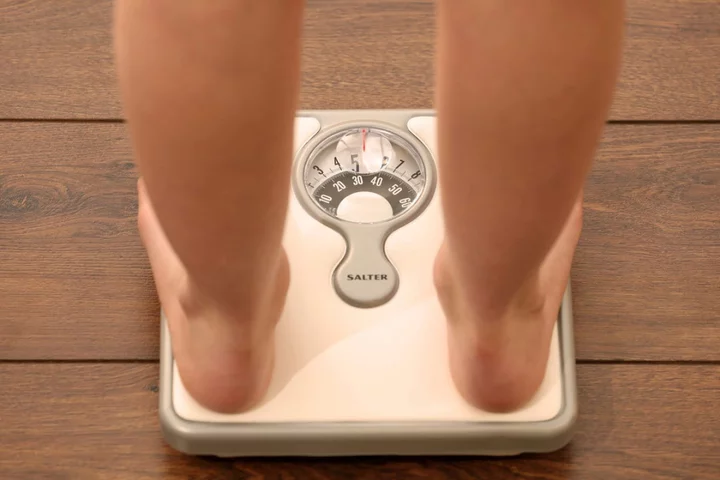
Intermittent fasting ‘no better for weight loss’ than calorie counting
Time-restricted eating, commonly known as intermittent fasting, may produce similar weight loss results for adults with obesity compared to traditional calorie counting, according to a new study. The small clinical trial, whose results were published on Tuesday in the journal Annals of Internal Medicine, found that participants who engaged in 8-hour time restricted eating had improved insulin sensitivity compared to those in the control group who ate their calories any time over 10 or more hours a day. Over a billion people worldwide are obese with the with the disease projected to grow in prevalence across the globe, according to the World Health Organization. Obesity has also been found to be a serious risk factor for other metabolic diseases such as type 2 diabetes, heart disease, and some types of cancer. A widely adopted tried-and-tested method to lose weight is to burn more calories than one consumes, and to achieve this, individuals typically count the calories of the food they eat each day. While this traditional approach for losing weight involves counting calories, time-restricted eating, without calorie counting, has also emerged as a popular strategy as it is easier to follow. However, whether intermittent fasting is as effective in producing weight loss, especially beyond the short term, has remained unclear. In the new research, scientists from the University of Illinois Chicago studied 90 adults with obesity from the Greater Chicago area to determine whether intermittent fasting or calorie restricted eating would be more effective for weight control and heart disease risk reduction. Researchers randomly assigned participants to 1 of 3 groups: 8-hour time-restricted eating from noon to 8:00 pm only without calorie counting; reducing a fourth of their calories daily; or no change in calorie consumption with eating taking place over 10 hours or more throughout the day. Participants who followed time-restricted eating and those adopting calorie restriction met regularly with a dietician. The study found that participants who engaged in time-restricted eating ate 425 fewer calories per day than the control group and lost about 4.5kg (10lb) more than the control group after one year. On the other hand, the calorie-restricted group ate 405 fewer calories per day and lost about 5.5kg (12lb) more after one year, with participants in both groups showing high adherence to their interventions. Scientists believe the new study and its findings can help make better-informed clinical decisions by taking individual preferences into consideration, rather than just choosing a diet that may be more effective. Researchers also point out that access to dieticians likely helped the participants make healthier food choices. As there was substantial individual variability in weight loss among participants using these interventions, they called for further research to determine who would most benefit from each of these diet choices. Read More Scientist behind Ozempic says drug can make life ‘so miserably boring’ Teens with severe obesity are turning to surgery and new weight loss drugs, despite controversy Two children were born with ‘insatiable hunger’ that left them severely obese. Now scientists know why British toddler has American accent after watching popular YouTube show GB News in ‘significant breach’ of Ofcom rules over Covid vaccine claims NHS unions vote to accept government pay deal – but nurses could still strike
2023-06-28 15:46
